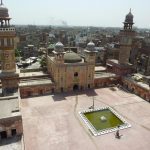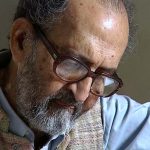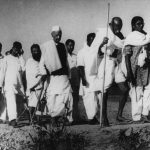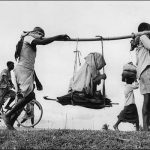Interviewed by Amber Abbas
Sir Syed Nagar, Aligarh (May 1, 2009)
Transcript
Biographical Notes: Professor Masood ul Hasan was born in Moradabad in 1928. He completed high school from Hewat Muslim High School. His father was an employee of the Municipal Board. He completed his F.A. (Intermediate) from Government Inter-College, Moradabad. He studied in the Aligarh Muslim University from 1943 to 1947 where he completed his B.A. and M.A. in English Literature. He completed his Ph.D. in Liverpool while he was appointed as a Reader in the Department of English at AMU. He retired from AMU in 1988 after serving as Professor of English, Chair of Department of English and Dean of the Faculty of Arts. He also served as the Proctor of the University. He continues to live in Aligarh, in Sir Syed Nagar. Professor Masood ul Hasan has two children, Seema and Naved Masood.
Context Notes: This was my third interview with Professor of English Masood ul Hasan. I finally arrived at his house without getting lost, riding my own bicycle. He welcomed me warmly and we sat down to tea and biscuits and a friendly conversation.
Professor Masoodul Hasan: (1:28:26.1) No, no. You see, when Gandhiji was assassinated, I had left this place, and in fact, on the day of his assassination I was on [a] train and found myself in quite an embarrassing and panicky position.
Amber Abbas: You were in Bhopal.
PMH: (1:28:50) I was in Bhopal, but I was traveling from Aligarh to Bhopal. I was on the GT Express. And they used to run a minority compartment in those days, especially for the minorities, under police protection.
AA: That was something that came up around partition time or that had always been there?
PMH: Minority compartments came in the wake of partition because of the great killings! Now of course, sometimes I use it, sometimes I don’t. But in those days I was religiously clad in a sherwani. And I avoided that minority compartment as my little assertion of self-confidence, in me. But I tell you, how the human mind changes—how the courage, how you pale. I entrained at Aligarh. It was a general compartment. Three or four constables with one hefty prisoner, who was an Afghan, they were sat there. We reached Tundla. Tundla is on the way. I had some nashta (breakfast) with me, and it was extra. I asked the constable “Bhai aapko agar koi (indistinguishable) ho tho mein oosko vo de doon? (If it’s okay with you, shall I give it to him?) Hanh. Of course it suited them because his meals they would get. And then they said, “Sahib, is ne tho hume Bareilley se yahan tak lane me kahan, or kaise…” (“Sir, this guy, just in the distance from Bareilly to here, we don’t know where or how—“) I don’t know these are the, those are the “do dafa hathkari tor chuka hein yeh” (“Twice he broke the handcuffs already”). Anyway. It was a passenger train up to Agra, it used to take very long. When we reached Agra Fort, I found a kind of uncanny silence all over there. Dark, it was January. I think yes, it was January. Dark and everything and pin-drop silence. No vendors. So I just didn’t know. And the entire compartment was vacated. I was left. I lost my nerve. Then I head some one say, “Gandhiji ko mar diya. (Gandhi has been killed).” Now the first thing that struck me, “Gandhiji ko kis musalman ne mara hoga. (Some Muslim must have killed Gandhi.)” And you know, very diplomatically and very wisely, Nehruji was the first to say bahut jaldi oon hone kaha “Oos ko ek Hindu fanatic ne mar diya.” (very quickly he told us “A Hindu fanatic has killed him”) I lost nerve, and I also shifted to the minority compartment, where, even those people had left, the policemen, because their destination had come. Now I didn’t have a direct ticket for Bhopal. I had a ticket for Agra and from Agra—because this was a passenger train—when I reached, the ticket was to be bought at Agra cantonment station. And the train touched there, the train missed this Agra Fort. When I reached there it was totally dark, it was forlorn and not a soul to be seen there. I went to the booking window and they said ke “Sir, Bhopal ke ticket aaj hi issue nehin hongey.” (“A ticket for Bhopal will not be issued today.”) I felt quite uncomfortable and panicky. “Nehin Sahib, aap aasey kijiyee ke accha, vo head ticket collector hein. (No, sir, you can do this- he is the Ticket Collector, there) You go to him.” And it was a dark—within the station. It was dark inside. I felt a little uncanny and I went there and I said, “I am employed there and I am due there tomorrow.” He thankfully issued a chit to me, I got the ticket and I went. And I reached home. So that was the day.
Posted on January 27, 2012



